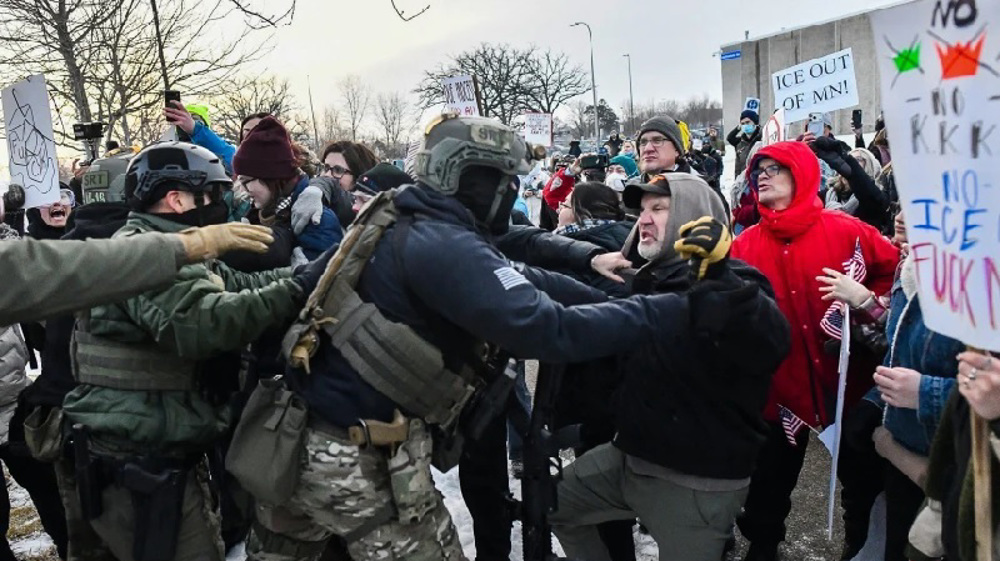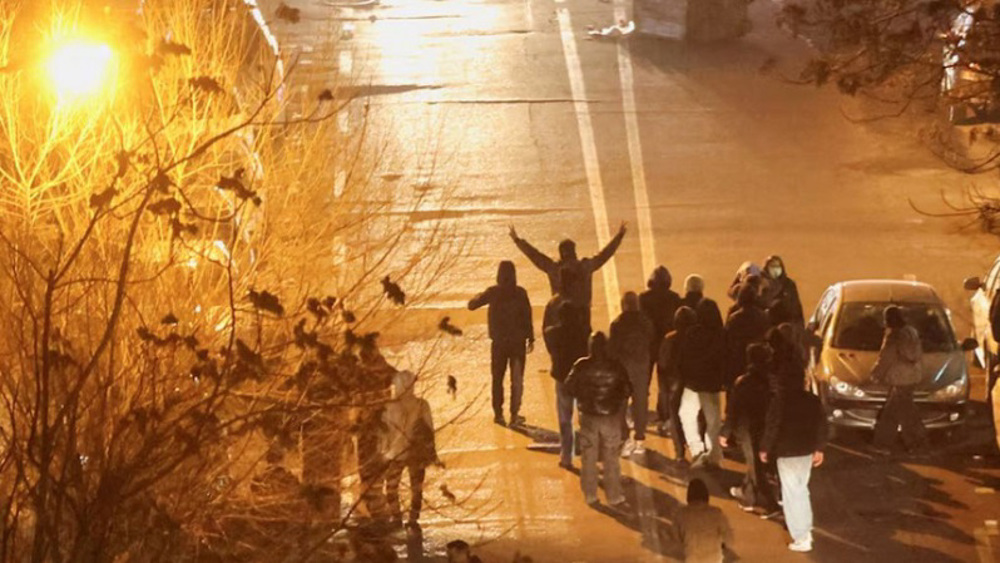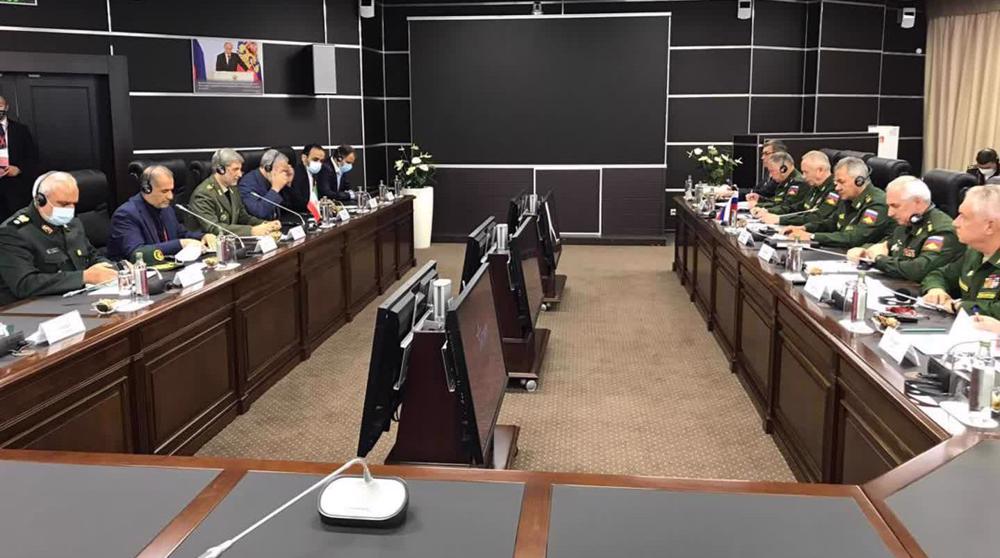US world order: delusional fantasy or perverse reality?
The American New World Order is based on both fantasy and reality. It is in fact a reality which way outstrips any fantasy hitherto portrayed. It has created far more disorder than order. Far too many countries have bowed to the will of the US, or fallen attempting to resist, or are suffering severe consequences as a result of not accepting a biased deal.
And now those nations are on a path to breaking US hegemony altogether. Iran is one such nation that has taken the helm.
The new world order was to be one of great power cooperation in the post cold-war era. At least that is how former US and Russian Presidents Mikhail Gorbachev and George H.W. Bush had envisaged it. But with the dissolution of the Soviet Union, there was not much of an Eastern bloc left to join forces with the US, which was soon to become the world’s sole and irrefutable superpower.
How can the US, with a population of less than 330 million, which it is currently struggling to administer, possibly hope to administer a population of about 8 billion? It has tried by putting punishment before reward, and force before friendship.
But by imposing some form of sanctions on three major eastern states, it has only pushed them closer together. The result? A new Eastern Bloc is arising, in defiant juxtaposition to America, an alliance between Iran, Russia and China!
It might be time for the USA to adopt a different strategy with countries, such as Iran, who insist on their independence and matters of national sovereignty, a strategy of diplomacy and mutual respect.
The friend of our enemy is our enemy.
Washington is in no position to dictate its will on other countries If like minded, and similarly sanctioned by the USA, nations come together, they can fill each other’s needs while presenting a strong, united, and effective front in overcoming US bullying and interference.
Iran could not have normal ties with some countries, such as South Korea which has seized billions of dollars of Iranian assets in compliance with the unilaterally imposed US sanctions.
A country moving in the direction of US interests is no different from the Americans themselves. That is part of the US scheme against us. The friend of our enemy is definitely our enemy as they are showing hostility.
Ebrahim Rezaii MP, National Security and Foreign Policy Committee
Financial profit is good but not the prime objective.
For the Islamic Republic of Iran of paramount importance is the need to let the likes of Venezuela know that they can take part in our alliance. Many countries, far more powerful than Venezuela, have not shown the wherewithal to stand up to excessive US demands.
To Iran, gaining profit by simply selling oil is not as important as proving the fact that Venezuela’s energy sector can be activated despite US’s disagreement.
Abdolali Rahimi Mozaffari MP, Energy Committee
Rather than sit around a table with a group of belligerent western bullies without achieving anything, the Foreign Ministry would do well to hold talks with impoverished nations instead.
Talking with these poor nations would earn us profits so that we can sell them oil or have transactions’ with them.
Ebrahim Rezaii MP, National Security and Foreign Policy Committee
Cooperation due to western pressure
The tri-lateral Eastern alliance between Iran, Russia and China is far more complicated than to have caused by a single Western factor, however, as Iran has been working to fortify the alliance by trying to realize long-term contracts with China and Russia.
Despite the overall eagerness and enthusiasm on all sides for the alliance, regenerative US hurdles must be overcome before it can materialize and come to full fruition.
What is not so complicated is the reason behind partnerships between boycotted states such as Iran and Venezuela, caused, predominantly by US imposed sanctions. Washington has not taken this very kindly or too lightly.
To interact, or not to interact?
There cannot be any meaningful interaction with the west due to US hegemony. Any interaction would be like the relationship between the wolf and the sheep. The US is seeking to devour the Third World, even more than it already has; a continuation of preexisting colonialism.
According to Mohammadreza Moballeghi MP, Social Committee “devouring some nations like Iran, however, is not just easy; rather it is impossible. It will never come true.”
New world “order” redefined
In the new world order the US hopes to impose, there is no room for independent states. The long term plan, under the guise of bringing democracy to these uncivilized nations, is to install puppet governments which, in turn, would maintain the US dollar as the world’s reserve currency.
These US interventions have left behind a trail of war-stricken and failed states, not to mention, boycotted states.
The global village is an excuse to pillage the weak.
The American claim that they pursue a new world order since the world has become like a village due to extended communications. Washington professes mastery of said village, thus, all other less developed nations are viewed as slaves, a founding principle of the barbaric actions of the west and the US in particular.
This derision of other nations even extends to their own European allies. A number of nations refuse to recognize the US-imposed order, thereby opposing US bullying and injustice. Since they refuse to accept US bullying they are slapped with US sanctions.
The leading country in this group is the Islamic Republic of Iran that refuses to bow to US bullying.
Ebrahim Rezaii MP, National Security and Foreign Policy Committee
It should not be forgotten that the disastrously lengthy and costly wars in Iraq and Afghanistan, not to mention the interventions in Syria and Libya, have not solely affected those countries, but the entire global economy. US sanctions are also posing a serious threat to nuclear non-proliferation.
Domination of global resources; true US motive.
US administrations, be they Republican or so called Democrats, have always sought to dominate natural resource rich nations in order to feed their energy insatiable industries. The Middle East, with its vast natural resources, has long been a target for the domineering approach of the USA. Having maintained a heavy presence in the region after the invasion of Afghanistan Iraq to, ostensibly, remove the Taliban and Saddam Hussein.
This time, they claimed to be fighting Takfiri groups. They caused chaos in Syria, the Yemen war broke out. The war on Yemen was launched by Saudi Arabia that is the US’s closest ally in the Persian Gulf.
Shahram Zolfaghari, Latin Affairs Analyst
Doing whatever it takes: the American mantra.
The Americans are taking advantage of the embarrassing situation in the region despite apparently suffering costs. The US president has acknowledged that his country has invested $7 trillion but gained nothing in return. In fact that is not actually true since major arms deals have been signed with Saudi Arabia, the United Arab Emirates, Qatar and other regional nations.
The arms manufacturing companies in the US and some of its allies including France and Britain are gaining major profits from the arms deals.
Shahram Zolfaghari, Latin Affairs Analyst
Even the best laid plans…
Globalization, which equates to strengthened global connections and interdependence, much to the dismay of the USA, has indeed benefitted no Bound by international capital, countries and individuals alike are exposed to unprecedented risks.
Those risks include, but are not limited to, an extreme imbalance in distribution of the benefits, and rendering individuals helpless in the face of the control imposed by international capital being reliant on the US dollar.
Enter The Dragon.
China with its powerful economy is a magnet for international trade. Its trade, import and export, is just under 12 percent of the global sum, going by the 2019 estimate. Now with more nations bringing their business to China and the new Eastern bloc of sorts,
a good volume of international trade can be conducted in local currencies of the states in direct business with one another. This would cut the dollar out of those transactions, and render parties independent of Western banks.
Each country pursues its own interests. But the question is that we have to minimize our losses and maximize our interests in our ties with other countries. During a specific period of time, we might have benefited more than now from dealing with China. But under those circumstances we were looking at the superpower.
Abdolali Rahimi Mozaffari MP, Energy Committee
The Latin American Connection.
Iran and Venezuela, both major members of OPEC the Organization of the Petroleum Exporting Countries, were banned from exporting oil by the US. A severe fuel shortage ensued in Venezuela, and Iran had the fuel and means to transport it to Caracas, which it did, in spite of US threats. Between late May and early June The Islamic Republic of Iran dispatched 5 gasoline tankers. The 60million Ton flotilla sailed across the Carribean to get over 1.5 million barrels of gasoline and petroleum derivatives safely to Venezuelan shores. Iran has also helped bring a defunct refinery back online.
Iran also dispatched a ship with food in June, most of it for the new Iranian supermarket in Venezuela, called Megasis. The supermarket is another means of mutual benefit, as it will boost the production and exports of Iranian commodities.
Iran’s ambassador to Caracas described the opening of the store as a move to “counter the US’ policy of economic terrorism and support the Venezuelan nation at the time of heightened sanctions.” Food and fuel shall flow freely to Venezuela henceforth.
Iran’s inauguration of a supermarket in Venezuela may be underestimated. That was a first step in the direction of supplying Venezuelans’ needs. Like us, they are under tough sanctions. However, what makes us different from Venezuela is that we are in good conditions in terms of production. We can supply our own vital needs, but Venezuela is in no position to do so now. Venezuela naturally needs support and help. The Defense Ministry opened the first branch of a chain store there.
Shahram Zolfaghari, Latin Affairs Analyst
Iran is expected to dispatch two to three monthly shipments of gasoline to Venezuela. This would help offload the gasoline inventory that Iran accumulates, as well as alleviate the fuel shortage in Venezuela. Also importantly, it would be defying US bullying..
How likely are other boycotted states to join this secondary market?
It cannot be said that Iran is a totally isolated nation since other nations take note of Iran and often come out in support of Iran.
Event at the UN Security Council, the former president – Indonesia – and the current president – Niger – expressly opposed the US’s attempt for sanctions snapback against Iran. That is a positive point. At an international body, the US demand was rejected and other efforts have been fruitful.
Shahram Zolfaghari, Latin Affairs Analyst
Iran and other independent states suffering the toughest US sanctions due to their independence, have begun a process of direct trade in money and in kind, amongst themselves. How efficient and successful is their method?
They decided to start a very smart movement in last few months which is exchange of products and articles they need such as gas oil aluminum and others. That is just avoiding US sanctions and it has a great message to US administration which is that US is very weak today, it can’t unite other countries against these two countries. This can be a model for all other countries which are under US sanctions.
Goodarzi, Iran-Venezuela relations analyst
But although Iran-Venezuela transactions are based on bilateral needs and fully legal, the US has openly threatened to sabotage and react wherever it can. That cannot be legal by international norms. However going against norms is normal for the US.
Iranian Foreign Minister Zarif asserts: "Unfortunately a law-breaking country (the United States) seeks to punish a country (Iran) that is abiding by law.... This method will have severe consequences for the world order."
So what are the Europeans doing?
It’s not just us lot. The US seems to have lost all respect even for its closest allies and cousins, the Europeans, in undermining their interests. The JCPOA or Iran nuclear deal would have secured trade between the 28-member European bloc and Iran. But the US pulled out and rattled that deal. In doing so it endangered the nuclear-nonproliferation process mentioned earlier.
Europe is right in doing all it can, or thinks it can, to keep the deal alive. The deal or whatever is left of it, is what created trust between Iran and the West, as it is a means of keeping Iran’s nuclear programme under surveillance, in return for lifting sanctions off this country to make way for foreign trade and transactions. And the US binned the deal!
Why is Iran so insistent on independence and possessing various means of national defence, such as ballistic missiles, which the US also has a problem with?! The answer can be traced in the West Asian country’s geopolitical positioning and history. The 8-year Iraq-Iran war of the 80s and Iran’s isolation is alive in memory, and its anniversary is just weeks away. But to refresh our longer-term historical memory:
The French, the more amicable of the three modern European powers, formed an alliance with Iran or Persia against Russia and Great Britain between 1807 and 1809, which it soon dropped to ally WITH RUSSIA, during the Russo-Persian War.
Apparently things aren’t that different today.
Defiant in the face of pressure.
We are going our own way. There are many obstacles. The US and its allies are jointly pressuring us. Some of these allies of the US apparently reject its pressure and sanctions campaign, but in practice the Western partners of the US have done nothing to relieve pressure on our country. And under such circumstances we are looking for actors and a way out. We have various tools at our disposal. We enjoy good international diplomacy and significant domestic production potential. We would need a group of elements that would help us get rid of the present circumstances, mainly sanctions and pressure.
Shahram Zolfaghari, Latin Affairs Analyst
Britain and Russia have a history with Iran.
Iran, never a colony of either the British or the Russians, impartial in both world wars, was strategically split for benefits. This goes back to well before the world wars, actually; to the mid-19th century. England wanted to keep Russia off India and outlets to the seas, referring to Iran’s southern waters opening onto the Indian Ocean. Thus, Iran became the dueling grounds for the imperialists.
No constructive work could be undertaken in this country, except upon the initiative of Russian banks in the north or of the British in the south. ….
Persian liberals or nationalists however, got to establish a constitutional monarchy and the first Parliament or Majlis was convened in 1906. Iran was put into the debt of the British and Russians however, and the two Powers planned to take control of this country for exploitation, under the guise of stabilizing its finances.
History repeats itself
In 1951 Britain made a grave mistake, turning an oil royalty issue into a matter of national pride for Iranians. In a similar vein, the current nuclear dispute with America could well turn into an object of Iranian national pride.
The US can still cut its losses and move on, but history shows that we learn nothing from history. And the US has had a really short history to learn from.
An encouraging projection for the future
I see a bright future for the country. I place hope in the future. Today, our people are not feeling quite well as they are under tough economic pressure. We owe them, but I hope in the future because we have millions of revolutionary specialized youth in this country, who can be effective in the future. Instead of resorting to East or West, we must rely on our own youth, elites and human resources. They are more valuable than our oil. If we rely on them our future will be bright and I am optimistic about the future.
Mohammadreza Moballeghi MP, Social Committee
Iran ministry slams EU’s blacklisting of IRGC as 'Illegal, hypocritical'
Hamas blasts Western media for blindly defending false Israeli narrative
ElBaradei condemns US threats of military action against Iran
VIDEO | Red the only colour in Gaza
‘No two-hour war’: Iran vows immediate retaliation to any attack
VIDEO | US warmongering threatens stability
Pezeshkian: US must end provocations if it seeks genuine diplomacy
Iran summons German ambassador over Merz’s ‘low-minded’ remarks























 This makes it easy to access the Press TV website
This makes it easy to access the Press TV website